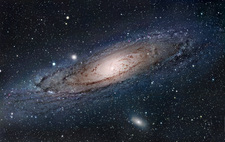
Kidding. Kinda.
To celebrate the end to another fantastic 'Stargazing Live' series last night, today I am posting an article I had published in MK Pulse Magazine (April 2011). The nation has yet again been wrapped up in a three day treat of astronomy and physics - and we've loved it! Physics was my least favourite science at school and I lapped it up. And I'm not even a Brian Cox Babe. Well done Dara, Prof Cox and team - here's to January 2014!
----
Astronomy - Accidentally Awesome
His heroic, immortalising space flight may have only lasted just longer than a football match, but Yuri Gagarin’s 1hr 48 minute voyage orbiting the Earth was the first penetration of space for humans during the Space Race of the 1960’s. On 12th April 2011, it [was] the 50th anniversary of the first man launching into ‘the final frontier’, but how has space exploration and research in the 21st century become so popular?
An interest in space exploration is no longer limited to a couple of science geeks in the front row in a Milton Keynes secondary school, but enthusiasm for the dynamic subject has boomed in recent years and astronomy has become “cool”. What child doesn’t love Buzz Lightyear and the spaceman featured on Kellogg’s Ricicles cereal boxes? Who hasn’t been entranced by the stories of the Northern Lights by Philip Pullman? We’ve even seen the beginnings of shuttle tourism. But why the sudden interest, half a century after the first space flight?
When everyone’s feeling the pinch in this financially challenging climate, astro-tourism is free. That’s got to be a good reason for the night sky’s popularity! Once you have a good set of binoculars or a telescope, all you need to view the sky from our very own rotating platform on Earth is a clear night. And when decent telescopes can be purchased for less than £100, it’s a small price to pay for the wonderment on your kids’ faces when staring skywards, their mouths gaping. Christmas sales of telescopes at John Lewis increased by 148% last year, and at the biggest observatory in the Midlands (Keele University), visitor numbers are up.
Of course, you can always use the view from your own eyes – free! A surprising amount of stars, constellations and even planets are visible to the naked eye. Dan Hillier, from the UK Astronomy Centre, Edinburgh, agrees. He says all you need to be doing is “looking up – that, you can do anywhere.” And if it’s cloudy, there’s always the DVD alternative, with hundreds of large and small budget space-based films available from your local library, and the new thriller ‘Apollo 18’ is being released to cinemas later this year [Ed - 2011].

under the cover of darkness.
Astronomy has become much more of an ‘every-man’s’ topic of conversation due partially to the exciting astronomical events we’ve seen this winter. The partial solar eclipse at dawn on 4th January sent many people off to work with heads bursting with intergalactic thoughts. Seeing amazing sights first hand really makes space seem closer to home and more accessible to all. We Milton Keynes residents can’t help but feel a little special too compared to the rest of the UK, as most of the country was under cloud cover that morning – let alone the fact that most people globally were still under the cover of darkness.
The rise of social media, the ever-widening use of the internet for information, and the sheer number of television channels available has undoubtedly had a large influence on the growth of astronomy in the UK. You only have to look at the huge popularity of the BBC’s Professor Brian Cox – a friendly, un-patronising expert who excites even the most anti-galactic housewife! He’s collected over 36,000 Facebook fans, and is fast approaching a Celebrity Chef kind of status, but for physics. Prof Cox’s recent show ‘Wonders of the Universe’ proved this by netting over 3.6 million viewers for the opening episode in March 2011.
Recent levels of interest may also have something to do with the 2009 International Year of Astronomy. You may not have heard of it in its full official title, but schools were presented with telescopes, and you may have noticed more TV documentaries and press coverage on everything intergalactic just over a year ago [Ed - 2010], to name a couple of the projects which ran that year. Conveniently, a special show even opened locally in the Milton Keynes sky on 7th August 2009 when a meteor burst into miniscule pieces (but perfectly positioned!) miles above us – a treat for any stargazer, amateur or otherwise.
The further you can get from sources of urban light pollution (street lights, light from houses etc.), the easier it is to look out into space. Modern photography technology has only improved this, with space exhibitions much more visual and colourfully enhanced nowadays, compared to the early grey and grainy images of the Moon landings. These photos show that there are more possibilities than we ever thought, from Mercury to Pluto, out in the black vacuum of space.
So before the darker nights of winter disappear into longer summer evenings, get out into Campbell Park, Willen Lakes, or your local school field, and see what you can discover. 50 years after his brave and ground-breaking trip, Yuri Gagarin would have wanted you to get involved!
Where will astronomy be 50 years from now?
----
Want to know more? Got the bug? Why not take a look at the free booklet on stargazing from the Open University?
What's the most interesting thing you've seen in the night sky?
See you next week!
Lou x
Find me on Facebook...
...And on Twitter
Born To Be A Tourist
Milky Way photo courtesy of In The Universe

 RSS Feed
RSS Feed
